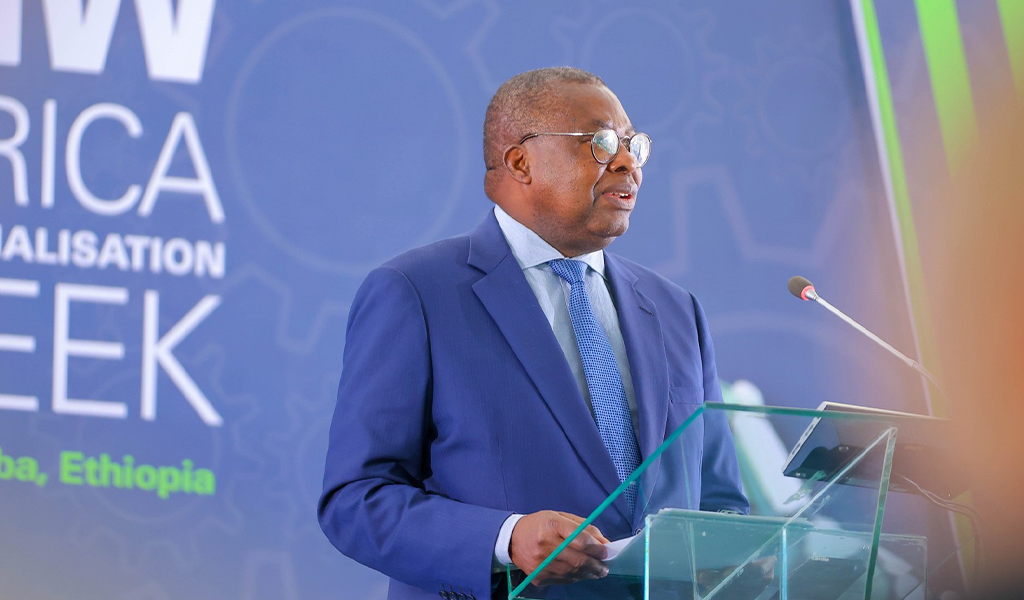Africa is on the brink of an industrial revolution, fueled by cutting-edge technologies and sustainable practices that are poised to transform its economies.
This year’s Africa Industrialization Week (AIW) 2024, organized by the African Union Commission (AUC), showcased the continent’s bold ambitions. Held in Addis Ababa, Ethiopia, from December 9–13 under the theme ‘Leveraging Artificial Intelligence (AI), Green Industrialization, and Intellectual Property for Africa’s Transformation,’ the event highlighted the critical role of innovation and sustainability in accelerating industrial growth and achieving the aspirations of Agenda 2063.
Speaking during the closing ceremony, Albert Muchanga, the AU Commissioner for Economic Development, Trade, Tourism, Industry, and Minerals, emphasized that the convergence of AI, green technologies, and intellectual property (IP) presents Africa with unique opportunities to accelerate economic growth, improve living standards, as well as establish resilience in the global economy.
Despite significant efforts, Africa’s industrialization progress remains slow. According to a 2023 UNIDO report, manufacturing accounted for only 10.4% of the continent’s GDP, with its share in employment at 7.4%. However, by comparison, Asia and Oceania recorded an MVA of 22.4% and an employment share of 15.4%.
To address this, Commissioner Muchanga called for urgent need for African governments to increase funding in research and development.
“Africa must increase investments in research and development (R&D) to catalyze industrial growth,” said Muchanga. According to 2023 statistics from the World Bank, African countries spend an average of only 0.45% of their GDP on R&D, falling below the global average of 1.7%.
“This underinvestment,” he noted, “hinders the structural transformation of Africa from commodity dependency to manufacturing.”
Additionally, Africa’s share of global patents remains disproportionately low, implying insufficient innovation and technological advancements originating from the continent.
Data from the World Intellectual Property Organization shows that in 2020, 52,736 patent applications came from Africa. In contrast, China, with a comparable population, filed over 1.3 million applications. “Some African countries have not registered any patents to date, with some last recording a patent as far back as 1984 before most of you in this hall were born,” Muchanga lamented.

The President of Afreximbank Benedict Okechukwu Oramah reiterated their commitment to fostering innovation through supporting the adoption of the Protocols to the AfCFTA Agreement related to Intellectual Property and Competition Policy.
“Afreximbank recognizes the strategic importance of these developments, and in this regard, has been sponsoring the initiative which led to the adoption of the Protocols to the AfCFTA Agreement related to Intellectual Property and Competition Policy in November 2023, unprecedented at that scale on the continent.”
By strengthening these frameworks, he noted, Africa can incentivize research and development, attract foreign investment, and foster a culture of innovation.
Dr. Akinwumi Adesina, President of the African Development Bank, highlighted the importance of women’s participation in industrialization. Despite comprising over half of Africa’s population, women receive only a fraction of the credit and financial services needed to expand their businesses. “This financing gap, estimated at $42 billion globally, is even starker in Africa,” noted Dr. Akinwumi Adesina, President of the African Development Bank. “When women succeed, their success ripples through communities, creating jobs, improving livelihoods, and driving inclusive growth.”
Balancing AI, Sustainability, and Industrialization
AIW 2024 tackled critical questions about the adoption of AI and green technologies. “How do we ensure AI enhances rather than displaces African manufacturing capabilities?” asked Professor Benedict Oramah of Afreximbank. He stressed the importance of building robust digital infrastructure, enhancing skills, and implementing consistent data governance frameworks to support AI adoption.
Accordingly, he said significant investment is needed to unlock the potential of Artificial Intelligence for Africa’s development. “Continental cooperation is essential to establish consistent regulatory frameworks for data governance and promote technology adoption,” said Professor Benedict Oramah. These frameworks, he stressed, will ensure Africa’s data sovereignty while fostering innovation through shared knowledge and investments.
Aligning Industrial Growth with Sustainability
The transition to green industrialization was also emphasized. Matthias Naab, Director of UNDP Africa Regional Center Service, emphasised the need for renewable energy investments to bridge Africa’s energy gap, with 600 million people still lacking access to electricity.
“Greening Africa’s industrialization path is critical to achieving sustainable growth while safeguarding our natural resources,” said Matthias Naab.
A Showcase of Innovation and Empowerment
AIW 2024 also featured several initiatives that highlighted innovation and inclusivity. The African Women in Processing Summit (AWIP) served as a platform to secure financing agreements for women entrepreneurs, while exhibitions showcased cutting-edge AI applications and green industrial practices by youth and women.
A vibrant fashion show celebrated Africa’s creative industry, with designers incorporating sustainable materials and showcasing the continent’s rich cultural heritage.
Africa Industrialization Week 2024 reaffirmed the continent’s commitment to advancing industrialization as a cornerstone of its transformation agenda. “By leveraging AI, green industrialization, and intellectual property, Africa can accelerate its economic growth, improve the quality of life for its citizens, and become a major and resilient player in the global economy,” said Muchanga.
As Africa charts its industrial future, it is clear that innovation, sustainability, and inclusivity will define its journey. “Industrialization is not merely an economic strategy; it is the foundation upon which the aspirations of Africa’s Agenda 2063 ‘The Africa We Want’ can be built.” He said.

